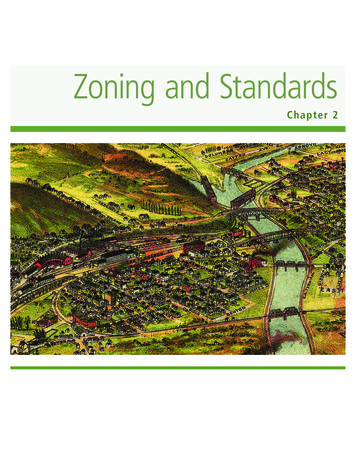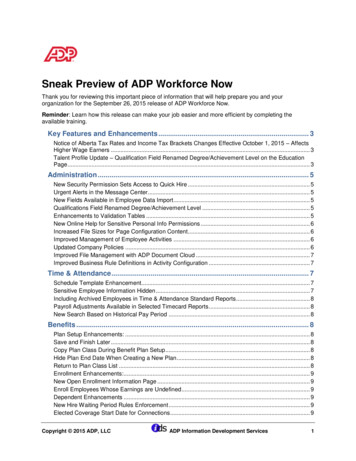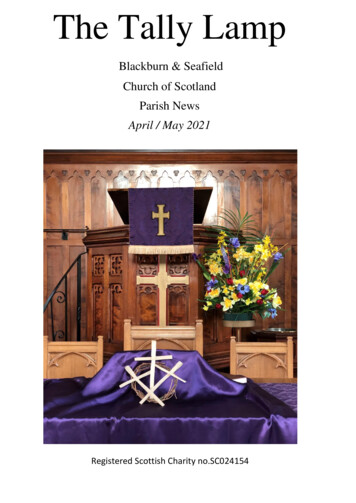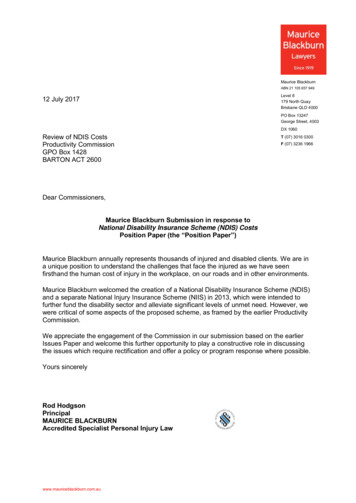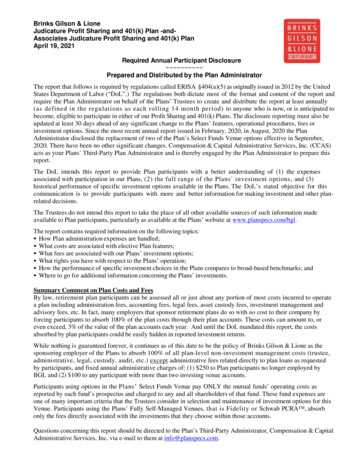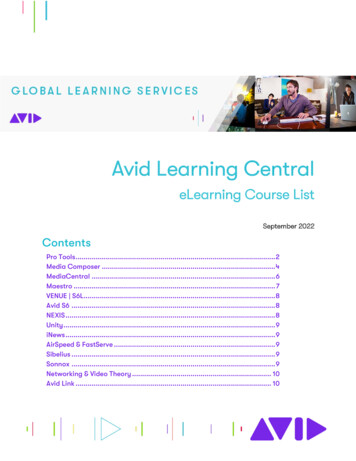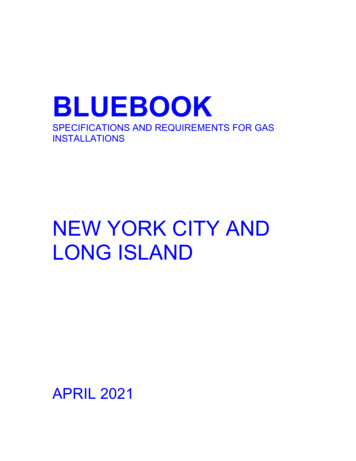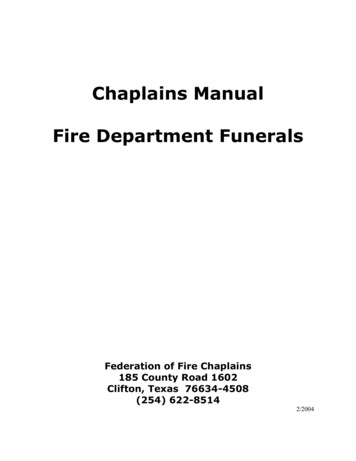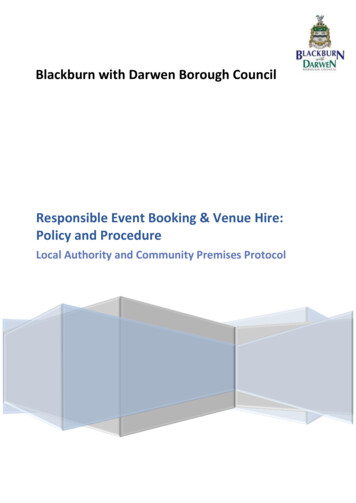
Transcription
Blackburn with Darwen Borough CouncilResponsible Event Booking & Venue Hire:Policy and ProcedureLocal Authority and Community Premises Protocol
ForewordBlackburn with Darwen is made up of communities that have shared values and principles embeddedin their fabric. Modern day challenges associated with extremism threaten the positive influence ofour diverse communities, which is why Blackburn with Darwen Borough Council (BwDBC) isrefreshing our approach to community cohesion and engagement with a renewed focus onstrengthening the bond our communities share, celebrating diversity, and isolating those that wishto deny, distort or divide us.As a vibrant multi-cultural borough we have a responsibility to protect our communities from speakerswho seek to spread hate using speech to incite violence or hatred and threaten community cohesion,health and public safety. It is vital that people are given the space to think and speak freely evenwhen we disagree or are offended by what they have to say. People do have a right to offend us, solong as we also maintain our right not to be subject to that which we find offensive.However, the line between free speech and hate speech is not easily defined. The challenge forpublic authorities like Blackburn with Darwen Borough Council is two-fold: Where is the line betweena person's right to offend and what they say requiring action be taken; and then what does the publicbody do about it?Whether it is racist groups or individuals who promote extremist ideas and sow seeds of division andhate in the borough, as a public body we need to ensure our buildings are safe and welcomingspaces for all, as well as seeking to use our influence to ensure other facilities in the borough aretoo.Building stronger and resilient communities is at the heart of everything we do here in Blackburn withDarwen. The approach to challenging hate speech and intolerance will require a multi-agencyapproach from other public and third sector organisations.We hope that local, private and community venues will also refer to our framework for guidance,should they be presented with events featuring individuals or groups promoting hatred andintolerance. Thus creating uniformity in approach and strengthening the status of this framework.Denise ParkChief ExecutiveBlackburn with Darwen Borough Council2 P a g e
ContentsForeword . 2Executive Summary . 4Introduction . 5What is the purpose of this document? . 5Who is the guidance for? . 5Why is this policy important?. 6Legislation and Due Diligence informing policy framework . 7The Counter Terrorism and Security Act 2015 . 7Crime and Disorder Act 1998 . 7Human Rights Act 1998 . 7Equality Act 2010: Public Sector Equality Duty . 9Local Elections in England & Wales . 10Due Diligence . 10Managing booking of venues . 11The SARA process . 11Information gathering process. 11Seeking advice or guidance . 13Who can raise a concern? . 14Responding to Events of Concern . 14The Decision Making Process. 16Frequently Asked Questions . 18Appendix 1: . 19Venues Booking Checklist . 19Appendix 2: . 20Event / Speaker of Concern – Reporting Form . 20Appendix 3: . 21Investigation Recording Form . 21Appendix 4. 24Guide for volunteers managing BwDBC community facilities . 24Glossary . 263 P a g e
Executive SummaryThe Responsible Event Booking & Venue Hire Policy has been compiled to assist Local Authority &Community Premises in Blackburn and Darwen with their hire procedures. Visitors to these venueshave the right to enjoy services and facilities without fear of intimidation, harassment, extremist orthreatening behaviour. This protocol provides guidance on mitigating the risk and the processesinvolved in ensuring that defendable and informed decisions are made when hiring out venues.When hiring venues for events, consideration should be given to Health and Safety, responsibilitiesunder various legislation, potential for reputational risk and impact on the community and visitors tothe premises etc. Where a booking has been made which causes concern, it is expected that thebooking be passed on to the relevant agencies for further checks.The main legislation/guidance governing this issue is:Statutory guidance issued under s29 of the Counter-Terrorism and Security Act 2015 makes explicitreference to the Use of local authority resources’ and outlines expectations of partnership workingand that , local authorities should ensure that publicly-owned venues and resources do not providea platform for extremists and are not used to disseminate extremist views’ through the establishmentof a responsible booking policy for public venues.As a responsible authority under the Crime and Disorder Act 1998, BwDBC also has a statutoryduty to work in partnership with other agencies to reduce and prevent crime. Maintaining publicorder is a priority for the Local Authority and the Police, therefore when an event poses a risk to thegeneral public, there are grounds to review and reconsider venue hire. Where the property is notunder Local Authority control, they can provide advice to the property owners/occupiers.The Human Rights Act 1998 sets out the fundamental rights and freedoms that everyone in the UKis entitled to. In some limited situations, certain freedoms are qualified meaning that publicauthorities may interfere with them. This is only possible where the authority can show that its actionhas a proper basis in law, and is necessary and ‘proportionate’ in order to protect Public safety,Public order, Health or morals, the rights and freedoms of other people.The Equality Act 2010 requires public bodies to have due regard to the need to eliminate unlawfuldiscrimination, harassment, victimisation and any other conduct prohibited by the Act as well asadvance equality of opportunity and foster good relations between people who share a protectedcharacteristic and people who do not. The latter relates to the need to tackle prejudice and promoteunderstanding.This policy provides practical assistance and support to venues in ensuring that local service usersare not subjected to messages of hate or intolerance of any kind. The recommended steps forManaging booking of venues are outlined in this document: Receive and identify booking requestsGather and assess the information and the level of risk posed by the eventCommunicating the process to the applicant and make a joint decision with partners onwhether event should or should not run forwardReview event and consider future booking requestsDetailed guidance on how to conduct information gathering, analyse the data, seek advice, raise aconcern and respond is provided. The appendix also includes a one page Venues BookingChecklist, Event/Speaker of Concern reporting form and an Investigation Recording Form.4 P a g e
IntroductionWhat is the purpose of this document?This Responsible Event Booking & Venue Hire Policy has been compiled to assist Local Authority &Community Premises with their hall hire procedures.Visitors to these venues have the right to enjoy services and facilities without fear of intimidation,harassment, extremist or threatening behaviour. A robust policy would assist to reduce the risk oflocal venues being vulnerable to hosting events which are not conducive to promoting cohesion,equality, diversity or tolerance.Local authorities have a responsibility to ensure their venues are not used by those with views thatmay draw people into terrorism, by ensuring that rigorous booking systems are in place and staffresponsible for them are trained to know what to do if they have suspicions.Whilst Blackburn with Darwen Borough Council (BwDBC) recognises the need to support Freedomof Expression amongst the community, it cannot support events which are contrary to the Borough’svalues.This protocol provides guidance on mitigating the risk and the processes involved in ensuring thatdefendable and informed decisions are made when hiring out community venues. Where a bookinghas been made which causes concern, it is expected that the booking be passed on to the relevantagencies for further checks.Who is the guidance for?This guidance provides practical assistance and support to venues in ensuring that local serviceusers are not subjected to messages of hate or intolerance of any kind. The recommended steps forthe booking process are outlined and it is anticipated that the following users will be expected torefer to this document:1. Venue booking staff / volunteers2. Centre Managers3. Governing Bodies/Trustees4. CaretakersThe types of venues covered by this policy include: Council owned and operated Business centres Libraries Community centres/ community assets Leisure centres Children’s centresPlease note that this list is not exhaustive and any person concerned with the booking or hiring ofCouncil owned and operated property should consult this guidance.5 P a g e
Why is this policy important?There are several important issues that must be considered when using community venues, someexamples of these are listed below: Regulatory enforcement frameworkA range of regulations are relevant to events (e.g. licensing, environmental health, noisepollution) and early discussion should be had to look at whether an event conforms to the relevantregulations. Reputational RiskLocal Authorities and venue owners will need to be made aware if there are concerns aboutspeakers who have a history of expressing extremist views and/or views that aren’t consistentwith British values using a private venue for an event in view of the potential reputational impactof an unsuitable booking. Consideration should be given to exposure from media coverage (thisencompasses both journalistic reporting and online posts). CharitiesThose organisations registered as a Charity should be aware that trustees have specific dutiesunder charity law which are relevant to the protection of their institutions. The CharityCommission has a variety of guidance available for trustees, including Chapter 5 of theCompliance Toolkit ‘Protecting Charities from abuse for extremist purposes’. 1 Amongst otherinformation, this provides guidance on managing risks associated with speakers, events andpublications. Illegal activitiesIt is important that venues pay due regard to preventing illegal activities i.e. fundraising forunlawful purposes, criminal activities or discriminatory actions etc. This should also includeactively limiting the effect of leafleting by extremist groups in or around their urposes6 P a g e
Legislation and Due Diligence informing policy frameworkThe Counter Terrorism and Security Act 20152The Counter-Terrorism and Security Act came into force on 1st July 2015. The Act imposes aduty upon specified authorities to have “due regard to the need to prevent people from being drawninto terrorism” and guidance anticipates that all Local Authorities will be partners in preventionefforts.The legislation makes explicit reference to the Use of local authority resources’ and that localauthorities should ensure that publicly-owned venues and resources do not provide a platform forextremists and are not used to disseminate extremist views’ through the establishment of aresponsible booking policy for public venues.“In order to maintain our existing high levels of community cohesion, promote equality andmaintain public order, Blackburn with Darwen Borough Council will not tolerate messagesof hate and intolerance in the borough”Crime and Disorder Act 19983As a responsible authority under the Crime and Disorder Act 1998, BwDBC has a statutory duty towork in partnership with other agencies to reduce and prevent crime.Maintaining public order is a priority for the Local Authority and the Police, therefore when an eventposes a risk to the general public, there are grounds to review and reconsider venue hire. Wherethe property is not under Local Authority control, they can provide vigorous advice to the propertyowners/occupiers.Health & Safety ConsiderationsSome events can attract significant attendance with the potential for disorder outside a premise andhealth and safety implications for staff, visitors and residents. Local authorities may need to assessthe risk, ensure appropriate measures are put in place or advise private venues accordingly.Human Rights Act 1998The Human Rights Act 1998 sets out the fundamental rights and freedoms that everyone in the UKis entitled to.In practice, the Act incorporates the rights set out in the European Convention on Human Rights(ECHR) into domestic British law; ensuring that law will be interpreted to uphold The Human RightsAct, no national law should directly conflict with The Human Rights Act 19984. In some limitedsituations, certain freedoms are qualified meaning that public authorities may interfere with them.2The Counter Terrorism and Security Act 2015 (Specific guidance under Part 5 of the statute)The Crime and Disorder Act 1998 (Specific guidance under Part 1 of the Statute)4Section 2(1) The Human Rights Act 199837 P a g e
This is only possible where the authority can show that its action has a proper basis in law, and isnecessary and ‘proportionate’ in order to protect:1. Public safety2. Public order3. Health or morals4. The rights and freedoms of other people.Below are examples of Human Rights that a Public Authority may seek to withdraw from a groupor individual.Article 10: The Freedom of Expression 5People have the right to hold their own opinions and to express themselves freely withoutgovernment interference. This includes the right to express views aloud or through:1. Published articles, books or leaflets2. Television or radio broadcasting3. Works of art4. Communication on the internetPublic authorities may restrict the right to freedom of expression if they can show that their actionhas a proper basis in law, and is necessary and ‘proportionate’ in order to: Protect national security, territorial integrity or public safety Prevent disorder or crime Protect health or morals Protect the rights and reputations of other people Prevent the disclosure of information received in confidence Maintain the authority and impartiality of the judiciary.It may be permissible to restrict a person’s freedom of expression if, for example, a personexpresses views that encourages racial or religious hatred.However, the public authority must show that the restriction is ‘proportionate’; the restriction mustbe no more than is necessary and appropriate and should not be excessive, in the circumstances.Article 11: Freedom of Assembly and Association 6People have the right to protest by holding meetings and demonstrations with other people.Nobody has the right to force anyone else to join a protest, trade union, political party or anotherassociation. On occasions, it can be acceptable for a public authority to restrict a person’s rights tofreedom of assembly and association. This is the case only where the authority can show that itsaction has a proper basis in law, and is necessary and ‘proportionate’ in order to:56Article 10 The Human Rights Act 1998Article 11 The Human Rights Act 19988 P a g e
Protect national security or public safety Prevent disorder or crime Protect health or morals Protect the rights and freedoms of other people.A ‘proportionate’ response to a problem is one that is necessary; appropriate and not excessive inthe circumstances.Article 14: Prohibition of Discrimination 7The Human Rights Act prohibits discrimination on a wide range of grounds including ‘sex, race,colour, language, religion, political or other opinion, national or social origin, association with anational minority, property, birth or other status’.Equality Act 2010: Public Sector Equality Duty8The Equality Act 2010 requires public bodies to have due regard to the need to:1. Eliminate unlawful discrimination, harassment, victimisation and any other conduct prohibitedby the Act2.Advance equality of opportunity between people who share a protected characteristic andpeople who do not share it; and3.Foster good relations between people who share a protected characteristic and people who donot share itThe latter relates to the need to tackle prejudice and promote understanding. A ‘protectedcharacteristic’ as defined in the Act includes age, disability, gender reassignment, pregnancy andmaternity, race (including ethnic or national origins, colour or nationality), religion or belief, sex andsexual orientation9.Gender SegregationLocal authorities are required to ensure they are fully familiar with their legal obligations underequality law and how this relates to their policy on gender segregation at events and meetings heldon their estate or in connection with their activities.Forced gender segregation is not consistent with British values. Where it occurs on the public estateor in connection with the functions of local authorities as public bodies there is a risk this will beviewed as tolerance or even support for such practices.It is important that the relevant staff are aware of: the legal obligations under equality law what is permissible and not permissible on a segregated basis Exceptions from equality law for religious practice and observance:7Article 14 The Human Rights Act 1998Section 149 of The Equality Act 20109Protected characteristics are discussed fully by Section 4 of The Equality Act 201089 P a g e
Segregation by gender will constitute unlawful discrimination except for in a few specifically definedpurposes falling within one of the exceptions under the Equality Act 2010. The general rule is thatexceptions in the Act must be interpreted narrowly as they are a departure from the fundamentalprinciple of equal treatment.Local authorities must not knowingly facilitate discrimination by others at the request of a speaker oran individual attending or wishing to attend an event. In order to comply with their duties under theAct, Local Authorities and their contractors should request information about the purpose of themeeting and firm detail of seating arrangements on any form used to book premises for events.If there is reason to suspect a risk of unlawful segregation, Local Authorities should conduct furtherinvestigation and, if proportionate, decline any bookings for the individual or organisation concernedwhere this would be justified under either their Equality or Prevent duties.Elections in England & WalesGuidance has been produced by the Electoral Commission for candidates and agents10 in relationto campaigning during elections. This maybe in the form of engaging with the public at meetings,promoting their views and responding to questions from the audience. Any individual candidate orparty list candidate is entitled to use publicly funded rooms and schools for public meetings.The Electoral Registration Officer11 keeps a list of the location and availability of meeting rooms intheir area. They will make this list available for inspection by candidates and election agents (andpersons authorised by them) from the day the notice of election is published. Candidates will be ableto use public rooms up until the day before polling day.Candidates must contact the owner of the premises to make a booking, giving reasonable notice toreduce the risk of the request being refused although any prior letting would take precedence.The Equality & Human Rights Commission have published guidance 12 for local authorities,candidates and political parties about how the legal framework for equality and human rights lawoperates in England, Scotland and Wales during local and national electionsDue DiligenceThis refers to the reasonable steps taken by the Council to avoid committing an offence under eitherCivil or Criminal law. In relation to this policy, BwDBC will conduct checks on individuals and groupsseeking to host an event in BwDBC owned and operated premises to ensure they are not espousingextremist views and are not associated with other extremism related activity.Rigorous scrutiny will assist in ensuring compliance with section 149 of the Public Sector EqualityDuty which includes having due regard to the need to advance equality of opportunity and fostergood relations between people sharing different “protected characteristics”.Those responsible for undertaking checks to ensure events are compliant and adhering to BwDBCvalues are reminded that conducting such checks should be managed sensitively andproportionately, in strict accordance with the legal requirements for information sharing amongststatutory partners and data protection k/ data/assets/pdf ://www.electoralcommission.org.uk/ data/assets/pdf an-Election-Period.pdf10 P a g e
Managing booking of venuesThe SARA processBwDBC recommend undertaking the SARA process (Scan, Analyse, Respond and Assess) to safelyadminister and manage booking of venues.ScanReceive and identify booking requestsAnalyseGather and assess the information and the level of risk posed by the eventRespondCommunicating the process to the applicant and make a joint decision with partnerson whether event should or should not run forwardAssessReview event and consider future booking requestsInformation gathering processWhen information is collected for the purposes of sensitive decision making, there must be a clearand thorough process that collates relevant information from a variety of sources.It is anticipated that during this exercise, it will often be necessary to consult appropriate partnerorganisations for advice and guidance (i.e. when trying to interpret information or to betterunderstand the context).Once the type of venue has been confirmed, information about the event should be gatheredconsidering the following points:1. The hiring party should be requested to provide details of the event. This may involve anadvance look at the materials which the speaker intends to present, an agenda for themeeting, names of speakers, seating arrangements etc. as well as copies of any promotionmaterial or social media marketing.2. An ‘open source search’13 should be conducted for any information regarding the event/ keyspeakers / organisation.3. Any material found as a result of the search should be critically assessed in terms of:a. Its validity and reliability (this can be informed via the source of this information and theauthor or publisher details)b. Is there any evidence or information to suggest that the speaker has promoted messagesof hate or intolerance towards any groups that are protected under the Equalities Act 2010c. Is there any evidence or information which suggests that the speaker has been banned orprohibited from speaking elsewhere nationally or internationally?d. Any indication to suggest potential public order issues as a result of this event?4. Engage in dialogue with the hiring party and / or the speaker.13An Open Source search is a search conducted on the Internet for any information that is freely available to the general public. Anyinformation that is restricted access and is not freely available to the public is not considered to be ‘open source’.11 P a g e
Open Source Information GatheringWhen conducting open source internet searches, primary source material must be considered asthe preferred data type. This is because data emitting from a secondary source may have beenmisinterpreted or misrepresented, thus hindering the overall validity and reliability of the information.For this reason, it is important to be wary of over relying on information contained within blog sites,or opinions/hearsay shared on social media (‘fake news’).What is primary and secondary information?Below is a table which outlines the differences between sources with some examples.Primary Source DataAny data written by the original author,Primary data is original data straight from theperson or group that you are interested in.Examples: A book/ journal written by theoriginal person, the person’s own Facebookaccount, a clip of the person talking or theband playingSecondary Source DataAny information which may make use of theoriginal author’s work,Examples: Any newspaper article whichdiscusses an author’s work but is written bysomeone else, any information which maytalk about the group that you are interestedin, but is not written directly by them.Reflections for data gathering onlineThe following reflections have been outlined to assist the information gathering process. It isimportant that these are taken into account as they will affect the quality of the data gathered andin turn have a bearing on the decision making process to allow an event to take place or not. It isimportant that a thorough assessment is completed in order to arrive at a well informed decision.When using the internet and conducting open source searches, aim to use a variety of differentwebsite and search engines. This will negate any bias and if the same information is availableon a variety of sources, this does suggest it is more credible. Finding the same information acrossa number of different sites will also expose a number of varieties in opinion and interpretations.Primary source data is more reliable and valid than secondary accounts or interpretations on theinternet. For example, can you find a group manifesto? Are there any YouTube videos containingthe group or person in question? Originality in sources will eliminate secondary opinions andalternative interpretations of material.Whatinformationis availablethe website?Is thereempirical data which is from anUsemorekindthanofoneinternet searchengine toonminimizesearch enginebiasauthoritative source? Is the website prone to unsubstantiated opinions or conspiracy theories?Or is there a well-reasoned and informed data set available? Are there any references availableforyoupossibleto assesson the sourcewebsite?Look at(e.g.theAdatesofmanifestothe website,arewebsite;they current?If theWherefind primaryinformationgroup’son theirYou Tubewebsiteof date,considerits credibilityreliability.videos ofisa outpersonspeakingor band’smusic; an andindividual’stheir blog)Are there any organizations affiliated with the website in questions? Remember, just because aIs the website stating information as fact (“depression is the most common mental illness in the UK”),websitehas givinga logosomethingor link, thisconclusiveevidenceoris it clearlyas isthenotauthor’sopinion?(“I don’t that the organization in question doesendorse the website views or policies. Can you verify these links?12 P a g e
How to analyse the information that you have collatedAs per th
Building stronger and resilient communities is at the heart of everything we do here in Blackburn with Darwen. The approach to challenging hate speech and intolerance will require a multi-agency approach from other public and third sector organisations. We hope that local, private and community venues will also refer to our framework for guidance,
